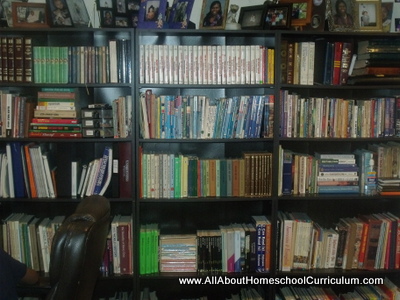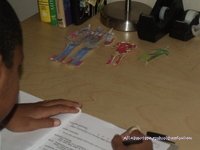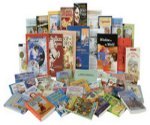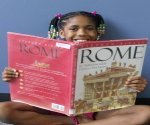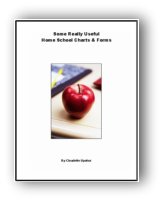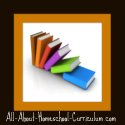Major Types of Curriculum for Homeschoolers
There are so many types of curriculum to choose from when you start homeschooling. How do you decide? Learn about the differences and similarities between traditional, unit study, Charlotte Mason, and a few other options.
As you begin researching your options for homeschool curriculum, be sure to learn as much as possible about the advantages or disadvantages of each method.
I don't want to get too technical or delve into the learning styles or your particular style of teaching because those things have already been thoroughly covered in several helpful resources written by popular authors such as Mary Pride, Cathy Duffy, and Teresa Moon.
Homeschool Curriculum Resources
|
Traditional – This option provides student textbooks and teacher's support materials. It may also offer supplemental resources such as flash cards or other visual aids. It is designed for a typical teacher-classroom scenario and not necessarily suited for your child to work independently, although it may be possible in the higher grades. |
- Examples of this traditional type of curriculum include popular homeschool textbooks such as: ABeka, Bob Jones, and Christian Liberty Press publishers
- Advantages: self-motivated students will do well with this of resource
- Disadvantages: students who prefer more activities rather than lecture and reading selection would not prefer to use this method
|
Unit Studies – This form of study selects a particular "unit" to study such as space, computers or horses. Similarly, a unit study could cover a time period such as the Middle Ages, and take an entire semester, year or even two years to complete. |
Basically, you elect to study all or most of the subject areas surrounding this planned topic of interest.
Math and additional grammar lessons may need to be added to fulfill requirements particularly in the high school grades.
- Examples include: packaged programs such as Konos, Five in a Row, Prairie Primer, Sonlight, and Weaver
- Advantages: all children are able to learn together as a family, topics can be more thoroughly covered than what is typically presented in a chapter within a textbook
- Disadvantages: there can be a lot of preparation required sometimes with this type of curriculum and this might not be suitable for your lifestyle
It is also possible to design your own unit study or purchase packages that can be completed in a month or quarter's time. There are freebies to be found on the Internet, too, at places such as Homeschool Share.
Classical Education – This form of educational resource adheres to the features of the Trivium, which emphasizes rhetoric, logic, and grammar be taught to students.
- Examples: resources can be obtained from http://www.greenleafpress.com/, http://www.veritaspress.com/, and http://www.triviumpursuit.com/
- Advantages: children are exposed to literature, history, art, and language from the past in an effort to teach them how to learn fro themselves from these great contributions from long ago
- Disadvantages: this type of curriculum can be too rigid and limiting for some students, the study of Latin and Greek can decrease their ability to converse with peers studying more common languages, and parents may not have much prior knowledge of some of the subjects
Online Homeschooling – Student work is presented online and parents' role as teacher is greatly diminished, if not replaced by the "virtual instructor" and virtual classroom. Parents may still give tests and keep student records although most of that can be done electronically, too.
- Examples: Abeka.com, Bob Jones Distance Learning, Alpha Omega Publications Monarch program and Time4learning
- Advantages: your child can work independently once s/he learns how to operate this particular type of curriculum program, tougher high school courses can continue to be learned at home, child is able to participate in online forums and seek help from supplemental resources
- Disadvantages: the parent-teacher is replaced by the "virtual" teacher and classroom, the programs can be pricey
Charlotte Mason – This type of curriculum includes quality real books rather than workbooks and "dry" textbooks. Typically, they are referred to as "living books."
- Examples: AmblesideOnline is a free resource for families following the CM method, also several resources can be obtained from http://www.livingbookscurriculum.com or http://simplycharlottemason.com/
- Advantages: children create assignments in short blocks of time allowing for plenty free play, nature walks, and learning through exploration
- Disadvantages: there is no packaged curriculum and the parent-teacher is required to do dictations, reading aloud, and other activities with the child rather than assigning work in a textbook
A few other types of curriculum for homeschoolers include the unschooling, eclectic, and Montessori forms. These are more aptly referred to as "styles" because they follow a strong belief about the method in which a child learns best.
Those who hold to the Unschooling type of curriculum believe that children learn best through a natural or organic method of immersion in life. They encourage free play and expression and allow learning to occur "along the way." Any resources used will be those that interest the child although the parent may make certain resources available.
The Eclectic method is very similar to the unschooling method because it is child-driven. But, most recently, I see that it has also come to refer to a style of teaching where resources from multiple publishers are used. So, a family might be considered eclectic if the Mom uses ABeka for English, Saxon for math, and some of Sonlight's resources to teach history to all of her children.
The Montessori plan also encourages individual expression by students however it is more structured than the Unschooling way. There are also numerous age-appropriate resources developed to foster creativity and expression, through play, for those who utilize this form.
A Personal Thought on My Type of Curriculum
It has been my experience that the best type of curriculum is the one that you and your child will most consistently complete. Okay, not trying to "cop out" here but what use is it to talk about studying a plethora of subjects with your child yet only accomplish one or two?
We have had great fun doing unit studies and they are probably my most favorite type of curriculum.
However, when pregnant plus caring for a toddler, for example, it was easier to consistently complete a more packaged and complete program such as Christian Liberty Press or Bob Jones. At times like those, I might elect to just add a science unit to our studies that year.
I own several Montessori resources and enjoy using them very much. However, I am not that relaxed in my teaching at home as to allow our children the absolute freedom of Maria Montessori's program.
Currently, I am utilizing a more of an eclectic type of curriculum, pulling resources from what I feel is best for our children. I utilize traditional books, Charlotte Mason-style dictation, spelling, and reading, and endeavor to complete unit studies that interest our children.
I hope this helps as you continue your search for selecting your best type of curriculum to teach your children at home.
Sharing is caring!
Other Pages You Might Like:
|
Homeschool Curriculum Reviews |
Homeschool Curriculum Choices |
Annual Best Homeschool Curriculum Picks |
Go back to Homeschool Curriculum Page
Return from Types of Curriculum to Homeschool Curriculum Home Page
